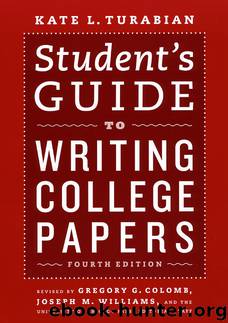Student's Guide to Writing College Papers by Kate L. Turabian

Author:Kate L. Turabian
Language: eng
Format: epub
ISBN: 9780226816333
Publisher: University of Chicago Press
14: Revising Sentences
14.1 Focus on the First Seven or Eight Words of a Sentence
14.1.1 Make Subjects Short and Concrete
14.1.2 Avoid Interrupting Subjects and Verbs with More than a Word or Two
14.1.3 Put Key Actions in Verbs, Not in Nouns
14.1.4 Put Familiar Information at the Beginning of a Sentence, New at the End
14.1.5 Avoid Long Introductory Phrases
14.1.6 Choose Active or Passive Verbs to Reflect the Previous Principles
14.1.7 Use First-Person Pronouns Appropriately
14.2 Diagnose What You Read
14.3 Choose the Right Word
14.4 Polish It Off
Your last big task is to make your sentences as clear as your ideas allow. On some occasions, you may know your writing is awkward, especially if you're writing about an unfamiliar and complex topic. But too often you won't recognize when your sentences need help. You need a plan to revise sentences that you know are a problem, but even more, you need a way to identify those that you think are fine, but that readers will think are not.
We can't tell you how to fix every problem in every sentence, but we can tell you how to deal with those that most often afflict a writer struggling to sound like a “serious scholar,” a style that most experienced readers think is just pretentious. Here is a short example:
1a. An understanding of terrorist thinking could achieve improvements in the protection of the public.
However impressive that sounds, the student who wrote it meant only this:
1b. If we understood how terrorists think, we could protect the public better.
To diagnose (1a) and revise it into (1b), however, you must know a few grammatical terms: noun, verb, active verb, passive verb, whole subject, simple subject, main clause, subordinate clause. If they're a dim memory, skim a grammar guide before you go on.
14.1 Focus on the First Seven or Eight Words of a Sentence
Just as the key to a clearly written report is in its first few paragraphs, so the key to a clearly written sentence is in its first few words. When readers grasp those first seven or eight words easily, they read what follows faster, understand it better, and remember it longer. It is the difference between these two sentences:
2a. The Federalists' argument in regard to the destabilization of government by popular democracy arose from their belief in the tendency of factions to further their self-interest at the expense of the common good.
2b. The Federalists argued that popular democracy destabilized government, because they believed that factions tended to further their self-interest at the expense of the common good.
In this section we will show you how to write a sentence like (2b)—or to revise one like (2a) into (2b).
Download
This site does not store any files on its server. We only index and link to content provided by other sites. Please contact the content providers to delete copyright contents if any and email us, we'll remove relevant links or contents immediately.
Asking the Right Questions: A Guide to Critical Thinking by M. Neil Browne & Stuart M. Keeley(5755)
Autoboyography by Christina Lauren(5226)
Eat That Frog! by Brian Tracy(4519)
Dialogue by Robert McKee(4385)
Sticky Fingers by Joe Hagan(4188)
Journeys Out of the Body by Robert Monroe(3615)
Annapurna by Maurice Herzog(3464)
Full Circle by Michael Palin(3443)
Schaum's Quick Guide to Writing Great Short Stories by Margaret Lucke(3369)
Elements of Style 2017 by Richard De A'Morelli(3339)
The Art of Dramatic Writing: Its Basis in the Creative Interpretation of Human Motives by Egri Lajos(3058)
Atlas Obscura by Joshua Foer(2952)
Why I Write by George Orwell(2944)
The Diviners by Libba Bray(2927)
The Fight by Norman Mailer(2926)
In Patagonia by Bruce Chatwin(2919)
The Mental Game of Writing: How to Overcome Obstacles, Stay Creative and Productive, and Free Your Mind for Success by James Scott Bell(2897)
Venice by Jan Morris(2568)
The Elements of Style by William Strunk and E. B. White(2470)
